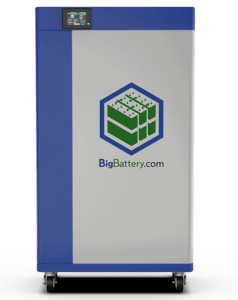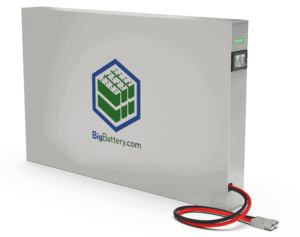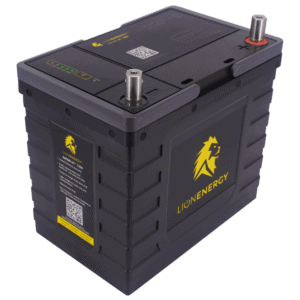Lithium Solar Batteries – Complete Guide and Recommended Options
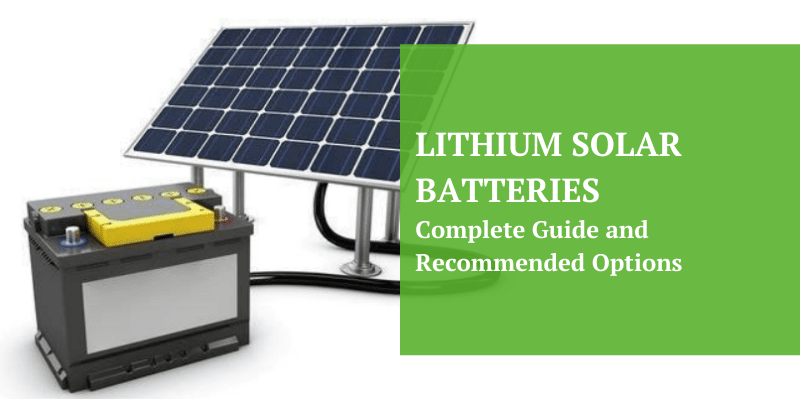
Written by Oliver. Last updated:
Table of Contents
One of the most important components in any off-grid or hybrid solar power system is the battery bank. After the solar panels have absorbed sunlight and converted it into useable electricity, it must immediately flow through to an inverter to supply power to a connected device, or it can flow through a charge controller to be stored in a solar battery.
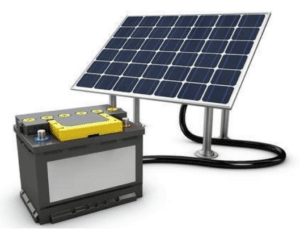
By storing solar power in an appropriate battery, you have the option to use it when you actually need it. This is incredibly important for off-grid applications, as you need to be able to access electricity after the sun has set. Without a rechargeable battery bank, you would be without power as soon as the sun went down, or whenever your solar panels were obstructed by anything from clouds to passing shadows.
How Can We Help?
To help you have a greater understanding of solar storage technology, we are going to explain everything you need to know about lithium solar batteries and power banks. We will discuss the pros and cons of lithium solar batteries and compare them to other types of batteries. From there, we will review some of the most popular options and recommend some high-quality lithium solar batteries that you can use to build you own solar battery bank.
What is a Lithium Solar Battery?
As the name suggests, lithium solar batteries are high-capacity, rechargeable batteries that were specifically designed for solar applications. They store solar electricity so it can be used to power electronic devices and appliances when required.
Essentially, a lithium solar battery is just a large-scale version of the lithium-ion batteries that can be found in modern day smartphones and laptops. In fact, lithium solar batteries that have the highest storage capacity ratings are almost identical to the batteries that are used to supply power to electric vehicles, like the Tesla Model 3 or the Nissan Leaf.
Lithium batteries have a much higher energy density than other types of rechargeable batteries. In general, a high-quality lithium solar battery can store up to 150 Watt-hours (Wh) of power per kilogram of weight. When compared to a standard nickel-metal hydride battery, which can only store about 60Wh per kilogram of weight, you realize why lithium batteries are so favorable for solar power systems, especially when portability is a concern.
How Do Lithium Solar Batteries Work?
A lithium solar battery consists of four primary components. A cathode determines the storage capacity and voltage of the battery, as it is the source of the lithium ions that store solar electricity. An anode enables the electric current your solar panels generate to flow through an external circuit. When the battery is charge, lithium ions within the anode hold the power.
The electrolyte within the battery is formed of salts, solvents, and various additives. This serves as the conduit for lithium ions that flow between the cathode and anode. The final component is the separator, which acts as a physical barrier that keeps the cathode and anode apart.
Of course, a lithium solar battery will then be contained within a safe and durable case, which will protect all of the sensitive components that make up the battery. In the more advanced solar batteries, you sometimes see built-in battery management systems (BMS), which protect the battery by offering over-charging and over-voltage protection, as well as temperature regulation.
What are the Advantages of Lithium Solar Batteries?
Higher Life Cycle Rating:
Unlike a standard alkaline battery, a lithium battery is capable of supplying a significant surge of power after a long period of low-level discharge. Another advantage that lithium batteries offer over other types of rechargeable batteries is a much higher life cycle rating. If you are unfamiliar with the term, a life cycle rating is a rough estimate of the total number of times a rechargeable battery can be fully charged and fully discharged before it will lose 80% of its storage capacity. Unfortunately, all rechargeable batteries will begin to degrade over time. However, lower quality batteries degrade at a much faster rate than high-quality lithium batteries.
Lengthy Lifespan:
A well-made lithium solar battery will also have a long lifespan, which is a measure of the amount of time a rechargeable battery can hold a charge before the power that is stored within it fades to nothing. Where other types of batteries can lose their entire charge due to natural draining issues over the course of a few weeks, a lithium battery will lose only about 5% of its charge per month.
For comparison, a standard nickel-cadmium (NiMH) battery will lose more than 20% of its charge in a month. When you consider the fact that many people use their solar power system or solar generator as a source of emergency backup power, it is no surprise that so many use high-capacity lithium solar batteries, rather than the alternatives. When the grid fails, or an emergency occurs, you want to be certain that your solar backup system actually has stored power that you can access.
Superior Overall Performance:
Given that they can be charged much faster than other types of batteries, have a superior storage-to-weight ratio than other rechargeable batteries, have a lengthy lifespan, and have an impressively high life cycle rating, it makes sense why lithium batteries are almost always the superior option for solar power systems.
Lithium solar batteries are also far more efficient than other types of rechargeable batteries. When discussing rechargeable batteries, efficiency refers to the amount of useable energy you get from a battery. When you charge a battery, some of that power is used during the storage process. The higher the efficiency of the battery, the more of the power within it is actually accessible and useable.
On average, a lithium solar battery will have an efficiency rating somewhere in the range of 90% to 96%, which is incredibly impressive, especially compared to the alternatives. Simply put, more of the electricity your solar panels generate can actually be used to run your electronic devices and appliances!
In fact, all of the highest quality off-grid and hybrid solar power systems will use a lithium solar battery as their power storage option. The same can be said for all of the leading solar generators on the market today.
Pros of Lithium Solar Batteries:
- Higher depth of discharge
- Longer lifespan
- Higher energy density
- Higher efficiency rating
- Less maintenance
- Higher life cycle ratings
As you can see, there are many compelling reasons why lithium solar batteries are the favored solar power storage solution.
Do Lithium Solar Batteries Have Any Drawbacks?
While it is difficult to argue with the fact that lithium solar batteries are a superior option for any solar power system that features a battery bank, they are not without their faults.
For starters, lithium batteries are very expensive to produce. On average, a lithium battery will cost nearly 40% more to make than a standard nickel-cadmium battery. This explains why the battery tends to be amongst the most expensive components in most off-grid and hybrid solar power systems. It also one of the leading reasons why electric vehicles often cost far more than gasoline-powered alternatives.
The next issue is stability. Unfortunately, lithium batteries contain an electrolyte that is fairly flammable. While this can cause issues with some of the smaller lithium-ion batteries you see in portable electronics, it only tends to be a problem with lower quality lithium batteries. In fact, these issues are almost unheard of in the larger scale lithium batteries that are used for solar storage applications.
What Could You Use a High-Capacity Lithium Solar Battery For?
If you are wondering whether or not you should consider purchasing a lithium solar battery for your solar power system, consider the fact that these are just some of the ways use these versatile and efficient power storage modules:
- Power storage for off-grid solar power systems
- Battery bank for grid-tied solar power systems
- Backup power for natural disasters and other emergencies
- Mobile solar power storage for RVs, camper vans, and food trucks
- Backup power for blackouts and grid failures
- Storing electricity during off-peak hours when the rate is cheaper, so it can be used during the more expensive peak hours
Lithium solar batteries are extremely versatile and useful. They are designed to store solar power efficiently and for lengthy durations. If you can think of a reason why you would want to store solar electricity, a lithium solar battery can help you achieve your aim!
What are the Best Options for Lithium Solar Batteries?
While the best option for you will always depend on your specific needs and the size of your solar power system, there are some outstanding options on the market today that find the perfect balance between performance, durability, and affordability.
The following are just some of our favorite options for high-capacity lithium solar batteries:
BigBattery is one of the top manufacturers of large-scale off-grid lithium battery modules, so it is not surprising to see one of their lithium solar battery banks on our list.
If you have never heard of BigBattery, you will be delighted to learn that they have a strong reputation for offering incredibly high-quality lithium batteries at competitive prices. They are also known for assembling their batteries domestically in California, and for backing all of their power storage systems with a comprehensive 10-year warranty!
Their 48V 15kWh KONG Elite Power Bank features the latest lithium LiFePO4 cells. With a total storage capacity of 15,500Wh, or 15kWh, it offers one of the best storage-to-cost ratios of any lithium solar battery bank on the market today. While the affordable price and impressive storage capacity should excite anyone that is looking to store a significant amount of solar power, the KONG Elite offers even more.
For starters, users have the option to easily connect up to 8 KONG Elite Power Banks, which means you can easily store enough solar power to take an entire home fully off-grid. With just two Kong Elites, you would have a 48V battery bank that could store 30kWh worth of solar electricity!
The KONG Elite Power Bank also comes pre-installed with Anderson connections, which means you can quickly and easily connect it to your preferred inverter and charge controller.
48V KONG Elite Lithium Power Bank Key Features:
- Built-in LED display screen
- Compact modular design
- Made in the USA and backed by a 10-year warranty
- High operating temperature range
- Integrated caster wheels for portability
- 3000A short circuit protection
Our next top pick is also offered by BigBattery, which should be viewed as a testament to the brand’s overall quality. The WHITE RHINO offers many of the same features you get with the BigBattery KONG Elite, but in a much slimmer package.
BigBattery designed the WHITE RHINO to be direct competition for the popular Tesla Powerwall 2. When you consider the fact that the Tesla Powerwall 2 has a lower storage capacity (13.5kWh vs 14kWh) and it is over an inch thicker, it is difficult to argue with the fact that BigBattery achieved their aim of having the WHITE RHINO challenge its Tesla equivalent.
While the WHITE RHINO’s specifications certainly stack up well against the Powerwall 2, the really impressive thing is the fact that it is also significantly cheaper! Given that the BigBattery brand places a great deal of importance on affordability, the budget-friendly price should not come as a major surprise.
In terms of practicality, the WHITE RHINO is designed so it can be mounted directly on a wall; however, if you looking for an easier option, it can sit in an upright position by simply placing it on a BigBattery floor rack. As mentioned above, one of the things that really sets the WHITE RHINO apart from its competitors is the fact that it is currently the world’s thinnest high-capacity lithium power block solar battery!
At just 4.4 inches thick, it is incredibly discreet and easy to install. The fact it only weighs 290 lbs also helps with installation. For perspective, many batteries that have a similar storage capacity weigh closer to 500 lbs! Like the KONG Elite, the WHITE RHINO is composed of ultra-safe LiFePO4 lithium cells and has an outstanding life cycle rating of 5,000 cycles. On top of that, it also features a built-in LED display and pre-installed Anderson connections.
Overall, it is an outstanding power wall-style lithium solar battery that offers a budget-friendly alternative to the incredibly popular Tesla Powerwall 2.
48V WHITE RHINO Powerwall Key Features:
- Integrated Quad-Redundancy Safety System
- Built-in LED display screen
- Incredibly thin profile and lightweight design
- Made in the USA and backed by a 10-year warranty
- Stackable with other BigBattery power banks
- Life cycle rating of 5,000 and an impressive lifespan
- Budget-friendly price, especially compared to the Tesla Powerwall 2
For those that are just looking to outfit a small-scale solar power system with a battery bank, we highly recommend this 1,344Wh lithium solar battery from Lion Energy. Despite its lightweight and compact design, the Safari UT 1300 offers the latest lithium battery technology and a wide variety of useful features.
With a standard group 24-size footprint and a total weight of just 23 lbs, the Safari UT 1300 is about half the weight and size of a traditional solar battery. Given that it contains the most advanced LiFePO4 lithium-ion cells, it is able to store up to 1,344Wh of solar electricity at any given time. It also has an impressive 3,500+ life cycle rating, so it is designed to supply reliable power for many years.
One of the most impressive things about the Safari UT 1300 is its outstanding lifespan. When used indoors under ideal conditions, the Safari UT 1300 can hold a charge for up to two full years! It is also incredibly efficient, which means you can full charge the battery in as little as 7 hours with solar power alone.
A single Safari UT 1300 has a 150A continuous and 900A peak discharge rate; however, if you need more power, you have the option to seamlessly connect it in parallel or in series with any number of Safari UT 1300s. This means your power bank can grow with your solar system.
Another highlight is the fact that Lion Energy outfitted this battery with an internal Battery Management System (BMS), which acts as a safety net to shut down the battery if it is operating outside of safe parameters. This also helps extend the overall life of the battery, as it prevents overcharging issues, as well as situations where it would otherwise operate outside of safe temperature ranges.
Overall, this is an outstanding lithium solar battery that is both budget-friendly and incredibly versatile. Whether you just need a single battery for basic backyard solar power system, or you are looking to outfit an entire RV or home with off-grid power storage capabilities, one or more Lion Energy Safari UT 1300 solar batteries can help!
Safari UT 1300 Lithium Solar Battery Key Features:
- Lifetime warranty
- Maintenance free
- Ability to retain a charge for up to 2 years
- Incredibly efficient
- Lightweight and compact design
- Built-in smart Battery Management System
We hope you liked this article. Please rate it or leave us a comment.
Average rating 0 / 5. Vote count: 0
No votes so far! Be the first to rate this post.

